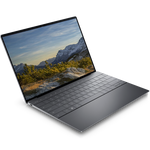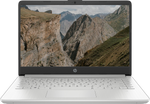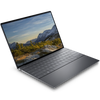A comparison of specs, key information, reviews, and best pricing from top retailers
Last updated -- hours ago | Report incorrect information
What we think

The PerfectRec laptop team Learn more
Updated January 10, 2024·
The Dell XPS 13 Plus, with its higher price, offers more storage, more RAM, a higher resolution OLED touchscreen display, and superior build and performance characteristics that make it well-suited for intensive tasks such as engineering work, 3D rendering, and machine learning. Its portability is excellent due to its lower weight and compact dimensions. On the other hand, the HP 14" Laptop is more affordable, and while it doesn’t match the Dell in terms of performance, it provides satisfactory performance for general usage and is slightly heavier but still portable. Consider the HP if you’re looking for a balance between cost effectiveness and competent performance for everyday tasks. Give Feedback
this description is based on the product variant with some specs and product variant with some specs. At the time of writing, the variant with some specs cost some dollars and the variant with some specs cost some dollars.
Advantages of the Dell XPS 13 Plus
- Very good for general use
- Very good for engineering and design
- Very good for software development
- Very good for content creation
- Very good overall display quality
- Very good overall build quality
- Excellent portability
- Very good battery life
- Best in class speakers
- Excellent keyboard
Advantages of the HP 14" Laptop
- The HP 14" Laptop has no clear advantages over the Dell XPS 13 Plus.
Key differences
General Use
8.4


6.7
3840 x 2400
RESOLUTION
1920 x 1080
OLED
DISPLAY TECHNOLOGY
IPS
374.0 nits
DISPLAY BRIGHTNESS
265.0 nits
10.0 Hours
BATTERY LIFE
8.5 Hours
9.0/10
KEYBOARD QUALITY SCORE
6.0/10
9.1/10
PORTABILITY SCORE
8.3/10
The Dell XPS 13 Plus is very good for general use, while the HP 14" Laptop is only fair.
The Dell XPS 13 Plus outperforms the HP 14" Laptop for general use largely because it has a more powerful CPU, more RAM, and a higher quality OLED screen, which are very important for smooth operation and clear visuals, along with better portability and longer battery life. While it excels in screen quality, keyboard quality, and operates with less noise, its higher performance comes at a cost which might not fit all budgets, in contrast to the HP, which offers modest performance for everyday tasks at a more economical price point.
Gaming and AI
6.4


5.8
3.8/10
OVERALL GPU SCORE
3.6/10
3840 x 2400
RESOLUTION
1920 x 1080
60Hz
REFRESH RATE
60Hz
No
SUPPORTS DLSS
No
No
MUX SWITCH / ADVANCED OPTIMUS
No
8.7/10
FAN NOISE SCORE
8.7/10
The Dell XPS 13 Plus is only fair for gaming and AI, while the HP 14" Laptop is poor.
The Dell XPS 13 Plus offers a more capable Iris Xe GPU and an OLED screen with higher resolution which enhances gaming and 3D experiences, while the HP 14" Laptop has a less powerful Vega 7 GPU and an IPS screen with lower resolution that may not be as suitable for more demanding graphics tasks. Both laptops have the same screen refresh rate, but the superior screen quality and GPU of the Dell XPS 13 Plus make it a better choice for gaming and 3D applications.
Engineering and Design
8.2


6.0
7.9/10
OVERALL CPU SCORE
4.6/10
3.8/10
OVERALL GPU SCORE
3.6/10
32.0 GB
RAM
8.0 GB
The Dell XPS 13 Plus is very good for engineering and design, while the HP 14" Laptop is only fair.
The Dell XPS 13 Plus offers a superior engineering and design experience with its more powerful processor, significantly more RAM, and a graphics solution that's more capable for demanding tasks, along with a sharper, higher quality OLED screen, which is important for detailed work. In contrast, the HP 14" Laptop has more modest hardware and an IPS screen with lower resolution, making it less suitable for intensive engineering and design use, although it is slightly more lightweight and potentially offers better portability.
Content Creation
8.3


7.0
7.9/10
OVERALL CPU SCORE
4.6/10
3840 x 2400
RESOLUTION
1920 x 1080
32.0 GB
RAM
8.0 GB
OLED
DISPLAY TECHNOLOGY
IPS
The Dell XPS 13 Plus is very good for content creation, while the HP 14" Laptop is good.
PerfectRec’s Content Creation Score takes into account the many different features of the laptop that make it more or less suitable for photo editing, video editing and other content creation tasks.
Software Development
8.3


6.8
7.9/10
OVERALL CPU SCORE
4.6/10
32.0 GB
RAM
8.0 GB
3840 x 2400
RESOLUTION
1920 x 1080
9.0/10
KEYBOARD QUALITY SCORE
6.0/10
The Dell XPS 13 Plus is very good for software development, while the HP 14" Laptop is only fair.
PerfectRec’s Software Development Score takes into account the many different features of the laptop that make it more or less suitable for software developers.
Screen Quality
8.4


6.3
13.4in
SIZE
14.0in
3840 x 2400
RESOLUTION
1920 x 1080
OLED
DISPLAY TECHNOLOGY
IPS
60Hz
REFRESH RATE
60Hz
374.0 nits
BRIGHTNESS
265.0 nits
The Dell XPS 13 Plus has a better screen than the HP 14" Laptop for general use, gaming and AI, engineering and design, software development, and content creation.
The Dell XPS 13 Plus boasts a high-resolution display with vibrant colors and brightness, making it well-suited for general use and engineering tasks where color accuracy matters, such as Adobe RGB and DCI-P3 color spaces. However, its modest refresh rate may disappoint gamers and 3D designers who prioritize smooth motion. In contrast, the HP 14" Laptop, with fair screen specifications, provides an adequate experience for general and engineering use but falls short for gaming and 3D work due to its lower refresh rate and less impressive color production.
Battery
10.0 Hours


8.5 Hours
The Dell XPS 13 Plus has 10 hours of battery life. The HP 14" Laptop has 8.5 hours of battery life.
Battery life estimate is based on a mix of common use patterns. More portable and higher performing laptops tend to have less battery life.
Portability
Excellent


Very Good
13.4in
SIZE
14.0in
2.7 lbs
WEIGHT
3.2 lbs
0.6in
THICKNESS
0.7in
The Dell XPS 13 Plus has excellent portability, while the HP 14" Laptop has very good portability.
The most portable laptops are small, thin, and light.
Build Quality
8.5


6.0
The Dell XPS 13 Plus has very good build quality, while the HP 14" Laptop has only fair build quality.
PerfectRec’s Build Quality Score incorporates case materials, display and keyboard flex, hinge quality, and overall reliability.
Cost
$1,849


$414
$0
$500
$1,000
$1,500
$2,000
$2,500
$3,000
The Dell XPS 13 Plus has a price of $1,849 and the HP 14" Laptop costs $414.

Let Us Help Find Your Perfect Laptop
Find your new laptop
Give feedback
We’re constantly working to improve.
How the Dell XPS 13 Plus and the HP 14" Laptop compare to other laptops
Spec Comparison
| Dell XPS 13 Plus | HP 14" Laptop |
GENERAL | |||
|---|---|---|---|
| Price | |||
$1,849 | $414 | ||
Release Date | |||
Release Date | May 1, 2022 | October 1, 2021 | |
Overall Dimensions | |||
Overall Dimensions | 11.6'' x 7.8'' x 0.6'' | 12.8'' x 8.9'' x 0.7'' | |
Weight | |||
Weight | 2.71 lbs | 3.22 lbs | |
Width | |||
Width | 11.63" | 12.76" | |
Depth | |||
Depth | 7.84" | 8.86" | |
INTERNAL | |||
|---|---|---|---|
Processor | |||
Processor | Intel i7-1280P | AMD Ryzen 5 5500U | |
RAM | |||
RAM | 32 GB | 8 GB | |
DDR Memory Version | |||
DDR Memory Version | 5 | 4 | |
RAM Slots | |||
RAM Slots | 0 | 2 | |
Storage | |||
Storage | 512 GB | 256 GB | |
BATTERY | |||
|---|---|---|---|
Battery Life | |||
Battery Life | 10 Hours | 8.5 Hours | |
Battery Capacity | |||
Battery Capacity | 55 Wh | 41 Wh | |
SCREEN | |||
|---|---|---|---|
Diagonal Size | |||
Diagonal Size | 13.4" | 14" | |
Display Technology | |||
Display Technology | OLED | IPS | |
Resolution | |||
Resolution | 3840 x 2400 | 1920 x 1080 | |
Refresh Rate | |||
Refresh Rate | 60Hz | 60Hz | |
Display Brightness | |||
Display Brightness | 374 nits | 265 nits | |
RELIABILITY, APPEARANCE & ACOUSTICS | |||
|---|---|---|---|
Build Quality Score | |||
Build Quality Score | 8.5/10 | 6/10 | |
Portability Score | |||
Portability Score | 9.2/10 | 8.3/10 | |
Gaming Laptop Appearance | |||
Gaming Laptop Appearance | No | No | |
Premium Business Laptop | |||
Premium Business Laptop | No | No | |
Fan Noise Score | |||
Fan Noise Score | 8.8/10 | 8.8/10 | |
HARDWARE FEATURES | |||
|---|---|---|---|
Keyboard Quality Score | |||
Keyboard Quality Score | 9/10 | 6/10 | |
Speaker Quality Score | |||
Speaker Quality Score | 9.5/10 | 6.5/10 | |
Webcam | |||
Webcam | 720p | 720p | |
Fingerprint Reader | |||
Fingerprint Reader | Yes | No | |
Backlit Keyboard | |||
Backlit Keyboard | Yes | No | |
Number Pad | |||
Number Pad | No | No | |
CONNECTIVITY | |||
|---|---|---|---|
USB Type-A | |||
USB Type-A | 0 | 2 | |
USB-C ports | |||
USB-C ports | 2 | 1 | |
USB-C Charging | |||
USB-C Charging | Yes | No | |
Display Outputs | |||
Display Outputs | 2 | 1 | |
Thunderbolt Version | |||
Thunderbolt Version | 4 | N/A | |
Shopping
Dell XPS 13 Plus
See more
Dig into reviews and images
NotebookCheck
Andreas Osthoff | July 2022
"The XPS 13 Plus is powerful, but has its drawbacks. Dell did not only update the processor generation, but also decided to offer two completely different models from now on. The XPS 13 Plus gets the faster Intel Alder Lake-P chips, and the Core i7-1260P in our review unit offers good performance figures. However, the device once again shows the problems of the current Intel CPUs, because the high performance requires a lot of power. This affects the battery runtime as well as temperatures, so the new model (even with the Optimized power profile) is louder than the older model."
HP 14" Laptop
See more
Dig into reviews and images
Consumer Reports
Nicholas De Leon | October 2022
"This feels like an ideal laptop for someone who doesn’t want to spend a lot of money on a laptop and isn’t too bothered by things like build quality or construction. It’s a laptop that will be used to pay bills, keep track of expenses, do some online shopping, and will be tucked away in a spare bedroom/home office. It’s an appliance designed to do a job without fuss. It’s not a premium experience—the materials do feel a little cheap, the display won’t exactly wow you, and the battery life is nothing to write home about, especially if you’ve used more expensive devices. But overall it’s not too shabby, especially for the price."
Get a great deal on the Dell XPS 13 Plus or the HP 14" Laptop
About Dell
Dell is a highly recognizable American technology company, and is one of the largest personal computer vendor by market share. Their laptops are very popular for both personal and professional use, and they also own the Alienware brand which makes mid to high end gaming laptops. Their premium XPS range of laptops offer great build quality and portability, while Latitude and Precision laptops are known for reliability, repairability and performance for business users.
About HP
HP, also known as Hewlett-Packard, is an American technology company that develops personal computers and computer peripherals. In the laptop industry, HP is known for its entry level Essential series laptops, its mid-range Pavilion, Envy, and Victus series, and high-end Omen and Spectre series, in addition to its business-oriented EliteBook, ProBook, and Dragonfly series laptops. HP laptops generally undercut other mainstream competitors in terms of price, placing itself as the value-oriented mainstream brand.
Give feedback
We're constantly perfecting our model
Laptop guides you might be interested in
More comparisons for you
FAQs
FAQs about laptops
Why trust us
This information was produced and vetted by the PerfectRec laptops team. We are a product research and recommendation organization that meticulously reviews and evaluates the latest laptop information and makes it digestible for you.
By the numbers
380
Laptops evaluated
48,640
Laptops stats compiled
13
Proprietary Laptops ratings developed
132,195
Recommendations made
28,643
Consumer hours saved
About the laptop team
Joe Golden, Ph.D
CEO and Laptops Editor
Joe is an entrepreneur and lifelong electronics enthusiast with a Ph.D in Economics from the University of Michigan.
Jason Lew
Staff Expert & Software Engineer
Jason is a staff expert and software engineer that has been making laptop recommendations for 7 years and moderates one of the largest laptop subreddits.
Chandradeep Chowdhury
Staff Expert & Software Engineer
Chandradeep is a staff expert and software engineer and expert in televisions and monitors. He’s been making monitor recommendations for ten years.
Craig Russell
Laptops Expert
Craig is a UK-based laptops expert. Craig works in IT, where he recommends and supports laptops and PCs for clients and has been recommending laptops on Reddit for five years.







